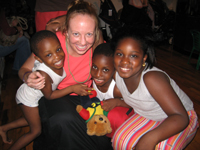 Did
you know that a four-hour flight from DFW Airport can take you to
the other side of the world? On July 22, Andy Beams, Jeanna Wright,
Robert Slaughter, Jennifer Montgomery, Jonathan Blissit,
Aaron Geoghan,
Herb Alfrey, and Donna Gleason met at DFW to head to New York for a
week of ministry with West Africans living in Harlem. The flight to
New York City is not long but one can experience just about any culture
in the world in New York. Did
you know that a four-hour flight from DFW Airport can take you to
the other side of the world? On July 22, Andy Beams, Jeanna Wright,
Robert Slaughter, Jennifer Montgomery, Jonathan Blissit,
Aaron Geoghan,
Herb Alfrey, and Donna Gleason met at DFW to head to New York for a
week of ministry with West Africans living in Harlem. The flight to
New York City is not long but one can experience just about any culture
in the world in New York.
New York City 's population is more than 60% foreign born and in 2005,
over 170 different languages were spoken in the city. As one of the
most populated cities in the world, this means that there is a huge
population of immigrants and refugees, many of whom still have strong
connections in their home countries. Where are all these people coming
from?
In 2005 about 3.5% of the city's population was South Asian, making
it home to a quarter of our nation's South Asians. Chinatown in Manhattan
became the largest community of Chinese people in the Western Hemisphere
in the 1980's. Since then, the Chinatown area of Queen's has surpassed
the population of Chinese in Manhattan. New York City has historically
been home to large populations of German, Irish, and Italian immigrants
but in more recent years populations of Brazilians, Puerto Ricans,
and Africans have grown into enclaves throughout the city.
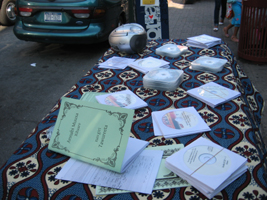 The team from 121 spent the majority of their time in the Little Africa
area of Harlem. Here they were able to interact with African people
from West African countries such as Senegal, Mali, Guinea, Cote
d'Ivoire, and Burkina Faso. Many West Africans began immigrating
to America in the 1980's but since 9/11, immigration has slowed considerably. Most of the West Africans living in New York are Muslim and have had
few opportunities to hear the gospel. The team from 121 spent the majority of their time in the Little Africa
area of Harlem. Here they were able to interact with African people
from West African countries such as Senegal, Mali, Guinea, Cote
d'Ivoire, and Burkina Faso. Many West Africans began immigrating
to America in the 1980's but since 9/11, immigration has slowed considerably. Most of the West Africans living in New York are Muslim and have had
few opportunities to hear the gospel.
Chris and Nicole have spent a year building relationships and seeking
ways to plant a church among these people. Chris lived in West Africa
for almost two years before a serious illness forced him home to America. After recovering he returned to Africa and once again became so sick
he was unable to stay. Nicole also spent time working in West Africa. Because of their knowledge of Africa and Chris being able to speak
a West African dialect, they have already built some key relationships
with many West Africans.
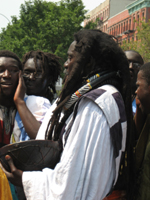 One
of the first steps in church planting, especially among unreached
peoples, is mass seed sowing, which simply means sharing the gospel.
Short-term teams are very important in completing this task. The
week in Harlem was spent manning tables where free copies of chronological
Bible stories in various West African languages were given away. Two
tables were set up, one on the main street in a community where a large
number of Senegalese live and do business and the other on 125th
Street just a block away from the Apollo Theatre. One
of the first steps in church planting, especially among unreached
peoples, is mass seed sowing, which simply means sharing the gospel.
Short-term teams are very important in completing this task. The
week in Harlem was spent manning tables where free copies of chronological
Bible stories in various West African languages were given away. Two
tables were set up, one on the main street in a community where a large
number of Senegalese live and do business and the other on 125th
Street just a block away from the Apollo Theatre.
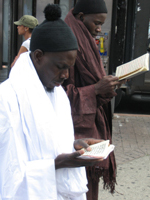 Some
very important contributions that 121 volunteers were able to make
are relationships that were built with the Senegalese community.
Up until that time Chris and Nicole had very little interaction with
the Senegalese community. The majority of the Senegalese in NYC are
Wolof; there are about 30,000 of them living in the Metro area and
they are less than 2% Evangelical Christians. Their primary religion
is a sect of Islam known as Muridism. Ironically, one of their most
important religious events of the year took place the last Saturday
the 121 team was in New York. The Murids from all over America converged
in NYC to take part in an annual parade that honored their leader,
Amadou Bamba. Earlier in the week the group that set up tables on 116th
Street were able to meet the leader of the Senegalese Association
of New York who in turn invited them to the mosque to meet the Imam
and then also to attend the parade on Saturday. So early on Saturday
morning the team met up with Chris and walked to the area where the
parade was set to begin. A large crowd of Senegalese had already gathered,
all in traditional dress. The team was ushered from one spot to another
and it wasn't long before they realized they were not just watching
the parade but they were in the parade! By walking about a half a mile
with this group the doors were opened for work to be continued among
the Wolof of New York City. Some
very important contributions that 121 volunteers were able to make
are relationships that were built with the Senegalese community.
Up until that time Chris and Nicole had very little interaction with
the Senegalese community. The majority of the Senegalese in NYC are
Wolof; there are about 30,000 of them living in the Metro area and
they are less than 2% Evangelical Christians. Their primary religion
is a sect of Islam known as Muridism. Ironically, one of their most
important religious events of the year took place the last Saturday
the 121 team was in New York. The Murids from all over America converged
in NYC to take part in an annual parade that honored their leader,
Amadou Bamba. Earlier in the week the group that set up tables on 116th
Street were able to meet the leader of the Senegalese Association
of New York who in turn invited them to the mosque to meet the Imam
and then also to attend the parade on Saturday. So early on Saturday
morning the team met up with Chris and walked to the area where the
parade was set to begin. A large crowd of Senegalese had already gathered,
all in traditional dress. The team was ushered from one spot to another
and it wasn't long before they realized they were not just watching
the parade but they were in the parade! By walking about a half a mile
with this group the doors were opened for work to be continued among
the Wolof of New York City.
The trip made
quite an impression on 121er's as well. For several of the members
this was their first venture into organized 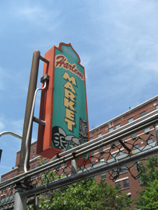 missions. Robert Slaughter
began the trip somewhat hesitant but left New York with a new sense
of God's desire to make Himself known through us. “I
don't feel like an evangelist, much less a good one. Yet in spite of
my self-perceived shortcomings, God used me to reach the unreached.
It's important to be patient, not to give up and let God unfold things
in His way. I don't think one should be cavalier about missions, but
it's not mandatory to be totally prepared in a ‘professional' kind
of way. God's much bigger than that and is not thrown off by one's
lack of knowledge or spiritual education… even one's shyness, for that
matter. I think He just wants obedient, earnest hearts. So, if God
can use me, feeling inadequate, overwhelmed, nervous and out of place,
He can use anyone who is willing.” missions. Robert Slaughter
began the trip somewhat hesitant but left New York with a new sense
of God's desire to make Himself known through us. “I
don't feel like an evangelist, much less a good one. Yet in spite of
my self-perceived shortcomings, God used me to reach the unreached.
It's important to be patient, not to give up and let God unfold things
in His way. I don't think one should be cavalier about missions, but
it's not mandatory to be totally prepared in a ‘professional' kind
of way. God's much bigger than that and is not thrown off by one's
lack of knowledge or spiritual education… even one's shyness, for that
matter. I think He just wants obedient, earnest hearts. So, if God
can use me, feeling inadequate, overwhelmed, nervous and out of place,
He can use anyone who is willing.”
New York is truly
a melting pot for the world. What better place to share Christ and
have it effect nations on the other side of the world? Most major
cities in America have a fair number of immigrants and refugees from
all over the world. Missions today does not mean that you have to
live in a mud hut in Africa – it can mean living in a New York apartment
in Harlem or frequenting the Indian restaurant down the street from
your home in Houston. Take a look around the Dallas/Fort Worth Metro
area and see where you can touch lives on the other side of the world!
It's all about opening your eyes and being willing to be used by a
Global God who is bringing the Nations to our doorstep! ::Donna Gleason
<<Back
to newsletter
|

 Did
you know that a four-hour flight from DFW Airport can take you to
the other side of the world? On July 22, Andy Beams, Jeanna Wright,
Robert Slaughter, Jennifer Montgomery, Jonathan Blissit,
Aaron Geoghan,
Herb Alfrey, and Donna Gleason met at DFW to head to New York for a
week of ministry with West Africans living in Harlem. The flight to
New York City is not long but one can experience just about any culture
in the world in New York.
Did
you know that a four-hour flight from DFW Airport can take you to
the other side of the world? On July 22, Andy Beams, Jeanna Wright,
Robert Slaughter, Jennifer Montgomery, Jonathan Blissit,
Aaron Geoghan,
Herb Alfrey, and Donna Gleason met at DFW to head to New York for a
week of ministry with West Africans living in Harlem. The flight to
New York City is not long but one can experience just about any culture
in the world in New York.  The team from 121 spent the majority of their time in the Little Africa
area of Harlem. Here they were able to interact with African people
from West African countries such as Senegal, Mali, Guinea, Cote
d'Ivoire, and Burkina Faso. Many West Africans began immigrating
to America in the 1980's but since 9/11, immigration has slowed considerably. Most of the West Africans living in New York are Muslim and have had
few opportunities to hear the gospel.
The team from 121 spent the majority of their time in the Little Africa
area of Harlem. Here they were able to interact with African people
from West African countries such as Senegal, Mali, Guinea, Cote
d'Ivoire, and Burkina Faso. Many West Africans began immigrating
to America in the 1980's but since 9/11, immigration has slowed considerably. Most of the West Africans living in New York are Muslim and have had
few opportunities to hear the gospel.  One
of the first steps in church planting, especially among unreached
peoples, is mass seed sowing, which simply means sharing the gospel.
Short-term teams are very important in completing this task. The
week in Harlem was spent manning tables where free copies of chronological
Bible stories in various West African languages were given away. Two
tables were set up, one on the main street in a community where a large
number of Senegalese live and do business and the other on 125th
Street just a block away from the Apollo Theatre.
One
of the first steps in church planting, especially among unreached
peoples, is mass seed sowing, which simply means sharing the gospel.
Short-term teams are very important in completing this task. The
week in Harlem was spent manning tables where free copies of chronological
Bible stories in various West African languages were given away. Two
tables were set up, one on the main street in a community where a large
number of Senegalese live and do business and the other on 125th
Street just a block away from the Apollo Theatre.  Some
very important contributions that 121 volunteers were able to make
are relationships that were built with the Senegalese community.
Up until that time Chris and Nicole had very little interaction with
the Senegalese community. The majority of the Senegalese in NYC are
Wolof; there are about 30,000 of them living in the Metro area and
they are less than 2% Evangelical Christians. Their primary religion
is a sect of Islam known as Muridism. Ironically, one of their most
important religious events of the year took place the last Saturday
the 121 team was in New York. The Murids from all over America converged
in NYC to take part in an annual parade that honored their leader,
Amadou Bamba. Earlier in the week the group that set up tables on 116th
Street were able to meet the leader of the Senegalese Association
of New York who in turn invited them to the mosque to meet the Imam
and then also to attend the parade on Saturday. So early on Saturday
morning the team met up with Chris and walked to the area where the
parade was set to begin. A large crowd of Senegalese had already gathered,
all in traditional dress. The team was ushered from one spot to another
and it wasn't long before they realized they were not just watching
the parade but they were in the parade! By walking about a half a mile
with this group the doors were opened for work to be continued among
the Wolof of New York City.
Some
very important contributions that 121 volunteers were able to make
are relationships that were built with the Senegalese community.
Up until that time Chris and Nicole had very little interaction with
the Senegalese community. The majority of the Senegalese in NYC are
Wolof; there are about 30,000 of them living in the Metro area and
they are less than 2% Evangelical Christians. Their primary religion
is a sect of Islam known as Muridism. Ironically, one of their most
important religious events of the year took place the last Saturday
the 121 team was in New York. The Murids from all over America converged
in NYC to take part in an annual parade that honored their leader,
Amadou Bamba. Earlier in the week the group that set up tables on 116th
Street were able to meet the leader of the Senegalese Association
of New York who in turn invited them to the mosque to meet the Imam
and then also to attend the parade on Saturday. So early on Saturday
morning the team met up with Chris and walked to the area where the
parade was set to begin. A large crowd of Senegalese had already gathered,
all in traditional dress. The team was ushered from one spot to another
and it wasn't long before they realized they were not just watching
the parade but they were in the parade! By walking about a half a mile
with this group the doors were opened for work to be continued among
the Wolof of New York City.  missions. Robert Slaughter
began the trip somewhat hesitant but left New York with a new sense
of God's desire to make Himself known through us. “I
don't feel like an evangelist, much less a good one. Yet in spite of
my self-perceived shortcomings, God used me to reach the unreached.
It's important to be patient, not to give up and let God unfold things
in His way. I don't think one should be cavalier about missions, but
it's not mandatory to be totally prepared in a ‘professional' kind
of way. God's much bigger than that and is not thrown off by one's
lack of knowledge or spiritual education… even one's shyness, for that
matter. I think He just wants obedient, earnest hearts. So, if God
can use me, feeling inadequate, overwhelmed, nervous and out of place,
He can use anyone who is willing.”
missions. Robert Slaughter
began the trip somewhat hesitant but left New York with a new sense
of God's desire to make Himself known through us. “I
don't feel like an evangelist, much less a good one. Yet in spite of
my self-perceived shortcomings, God used me to reach the unreached.
It's important to be patient, not to give up and let God unfold things
in His way. I don't think one should be cavalier about missions, but
it's not mandatory to be totally prepared in a ‘professional' kind
of way. God's much bigger than that and is not thrown off by one's
lack of knowledge or spiritual education… even one's shyness, for that
matter. I think He just wants obedient, earnest hearts. So, if God
can use me, feeling inadequate, overwhelmed, nervous and out of place,
He can use anyone who is willing.”